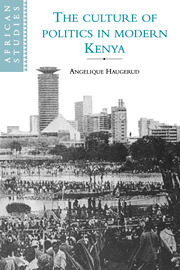Book contents
- Frontmatter
- Contents
- List of maps
- List of tables
- Preface
- 1 Introduction: staging politics in Kenya
- 2 Shattered silences: political culture and “democracy” in the early 1990s
- 3 Open secrets: everyday forms of domination before 1990
- 4 Moral economy and the quest for wealth in central Kenya since the late nineteenth century
- 5 The dove and the castor nut: Embu household economy in the 1980s
- 6 Conclusions: the showpiece of an hour
- Notes
- Bibliography
- Index
- Titles in the series
3 - Open secrets: everyday forms of domination before 1990
Published online by Cambridge University Press: 05 June 2012
- Frontmatter
- Contents
- List of maps
- List of tables
- Preface
- 1 Introduction: staging politics in Kenya
- 2 Shattered silences: political culture and “democracy” in the early 1990s
- 3 Open secrets: everyday forms of domination before 1990
- 4 Moral economy and the quest for wealth in central Kenya since the late nineteenth century
- 5 The dove and the castor nut: Embu household economy in the 1980s
- 6 Conclusions: the showpiece of an hour
- Notes
- Bibliography
- Index
- Titles in the series
Summary
To give a government the authority necessary for it, it is not enough to feel the need for this authority; we must have recourse to the only sources from which all authority is derived. We must, namely, establish traditions, a common spirit.
(Durkheim 1938: 90)Official language … sanctions and imposes what it states, tacitly laying down the dividing line between the thinkable and the unthinkable, thereby contributing towards the maintenance of the symbolic order from which it draws its authority.
(Bourdieu 1977: 21)Introduction
What is “Kenya” to women and men in Embu or any other countryside locale? A key institution that helps to anchor that abstraction in everyday life is the public assembly or baraza. Does a successful baraza help to constitute that Durkheimian “common spirit” necessary to sustain government authority? Even if answered affirmatively, this assertion provokes additional questions. As Kertzer (1988: 67) notes, “ritual can serve political organizations by producing bonds of solidarity without requiring uniformity of belief.” Thus a baraza crowd cheering enthusiastically in outward display of compliance with the ruling regime can create “solidarity” whatever the content of its private beliefs. It is joint participation in the ritual that is crucial to the polity. In precisely what sense, however, is such ritual socially integrative? To what extent do such occasions express or constitute value consensus? What models of the polity do they convey, and from what alternative conceptions do they deflect attention?
- Type
- Chapter
- Information
- The Culture of Politics in Modern Kenya , pp. 56 - 107Publisher: Cambridge University PressPrint publication year: 1995

